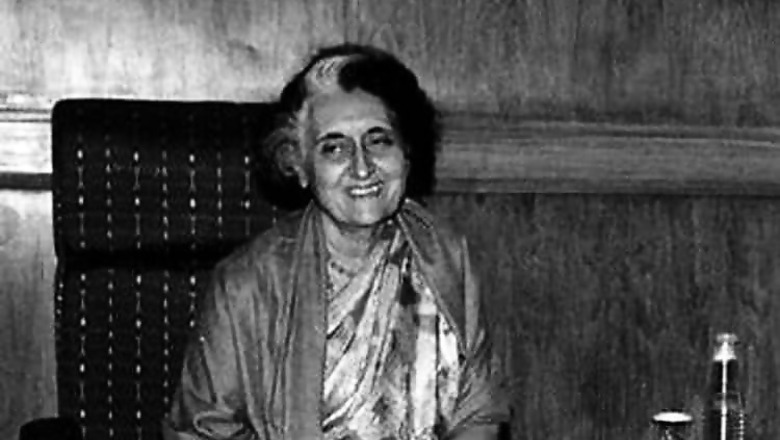
views
New Delhi: In 2009, we were working on a documentary on 25th death anniversary of prime minister Indira Gandhi. The documentary was titled "Indira of India".
I met many old time associates and adversaries of Indira Gandhi to understand her persona. I also met veteran journalists like Sir Mark Tully of the BBC, Inder Malhotra, eminent editor & the biographer of Indira Gandhi and Shekhar Gupta, the then Editor-in-Chief of "The Indian Express" seeking their views on Indira Gandhi’s regime.
All of them – be it Vasant Sathe or Subramanian Swamy, Tully or Malhotra - spoke about the jailing of Indira Gandhi by the Morarji Desai government on corruption charges. They were unanimous in their opinion that jailing Indira Gandhi and her son Sanjay Gandhi had helped the Congress to generate huge public sympathy and turn the tides in favour of her.
The government’s actions were seen as vindictive and it failed to achieve the desired goal by putting her behind the bars. Even though their original intention was to portray her as a corrupt leader, exactly the opposite happened after her jailing.
Even her harsh critics felt that jailing a woman was too much and the general public were anguished over her arrest. Indira Gandhi came out of jail as a victim.
According to the late Vasant Sathe, her Cabinet minister, Indira Gandhi’s arrest was ill timed. The Janata Party government was already unpopular and after one and a half years into power, it had lost the backing of the people.
The commoners had already concluded that it was a failure and were ready to give one more chance to Indira Gandhi led Congress. "By sending her to jail when the tide was turning in her favour, the Janata Party government dug its own grave. It was a very foolish decision. It was prima facie vindictive," Sathe told me in October 2009.
After the Allahabad High Court ruled her election to Lok Sabha illegal and instead of quitting Indira Gandhi chose to impose the Emergency in June 1975. The Emergency was lifted in January 1977 and Indira Gandhi led Congress lost to Janata Party in the Lok Sabha elections held in March 1977.
The Morarji Desai government constituted Shah Commission to probe alleged excesses committed during the Emergency. Sometime in the last quarter of the 1977, Indira Gandhi was arrested and kept in police custody for a night. The next day she was produced before a judge. Her arrest was in connection with an alleged financial scam called "the jeep scam".
According to former CBI joint director NK Singh, Indira Gandhi was arrested in 1977 in connection with the "jeep scam" case "after fully satisfying all legal and ethical aspects, surely not under any political pressure whatsoever", and that the purpose was "to put her under legal restraint, so that she was available for examination or interrogation" and that "she was produced in the court next morning as per requirement of law".
But, when she was produced before the court the next morning, she was unconditionally released immediately, as there was no substance in the charges against her. And nothing was heard thereafter about the so-called "jeep scam" case.
Ultimately, the Janata government under Morarji Desai had to invoke Parliament's privilege to accomplish their objective of putting her behind bars in Tihar jail for a week in 1978. In the third week of December 1978, Indira Gandhi was again arrested for the same alleged scam.
This time the Morarji Desai government had invoked Breach of Privilege and Contempt of Parliament to send her to jail. Her son Sanjay Gandhi was also sent to jail along with her. Both of them were released after a week.
Her young daughter-in-law Sonia Gandhi managed the household affairs during her absence and had even carried home cooked food to Tihar jail claim some old retainers of the Gandhi family.
After she came out of jail, Indira Gandhi became more decisive and took the Morarji Desai government head on. Even during the election campaign in 1980, the Congress used Indira Gandhi’s jailing to garner sympathy of the voters mainly villagers across India.
Perhaps Sonia Gandhi had this in her mind when she said, "I am Indira Gandhi’s daughter-in-law. I am not scared of anybody."















Comments
0 comment